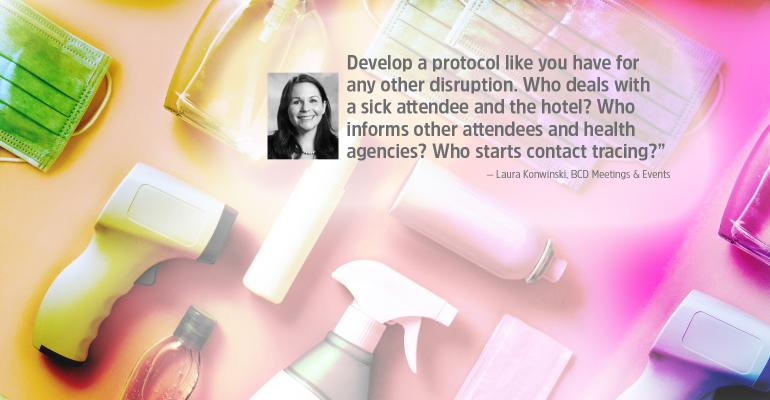To find answers for the other essential questions, scroll to the end of this article.
The good news is that there is a self-administered Covid-19 nasal-swab test from Abbott Labs called Binax NOW that provides results in 15 minutes, for about $20. There are other self-administered tests available, but they have greater time and cost considerations. For a corporate meeting in August 2020, Christine Hilgert, CMP, senior vice president of Meeting Expectations, sent saliva self-test kits to the 200 attendees so they could confirm they did not have Covid-19 within 72 hours of the event. Each test cost $150, though progress is being made on saliva self-tests that would cost less. Hilgert’s attendees took another saliva test when they got home, reporting the results to the event host in case contact tracing would be necessary. All attendees tested negative before and after the meeting, she says.
For additional protection, those attendees also had to submit to on-site temperature checks each day. “It’s not foolproof, of course, but it helps,” Hilgert says. In fact, up to 45 percent of Covid-19 cases are without fever or any other symptoms. Nonetheless, the host hotel for Hilgert’s event had a policy of checking the temperature of every guest when they arrived. After that, “we had our own temperature check each morning starting at 6 a.m., and attendees got a colored dot on their badge to show they were checked. They could not get into the meeting space without that dot on their badge, and we changed the dot color each day.”
For its World Education Congress that drew about 700 attendees in November, Meeting Professionals International also used temperature checks to screen for Covid-19. And the association contracted with on-site medical-support provider InHouse Physicians, who worked alongside MPI staff and local volunteers to conduct those checks at event entrances. Annette Gregg, CMM, senior vice president of experience for MPI, notes that attendees who test negative in the morning get a wristband as proof; its color changes daily, and it must be presented to enter the event each day.
Any meeting participant who shows an elevated temperature is asked to sit for 10 minutes, then be rechecked. If the second check also shows a high temperature, InHouse Physicians administers an Abbott ID NOW nasal-swab test at its on-site clinic; results come in 15 minutes and the attendee must pay for the test. Any attendee who self-reports as feeling ill will also be able to undergo a test.
A Positive Test. Now What?
In the event that an attendee tests positive for Covid-19, “we have to make sure that person feels cared for because they are away from home and likely alone,” says Amber Heintz, CMP-HC, vice president of program operations of Bishop-McCann. Support from the event host includes letting attendees know in advance how a quarantine experience in their hotel room will work in terms of medical services, food and beverage, and additional cost. “People have to know these things ahead of the meeting so they feel comfortable to attend,” she adds. “You could put this information in the mobile app in addition to the pre-event materials.”
For attendees of MPI WEC who test positive, “we have not mandated that they stay quarantined in the hotel,” Gregg notes, “but we will strongly suggest that they follow the CDC guidelines, which would mean a quarantine.” And if an attendee requires hospitalization, “InHouse Physicians would facilitate the transfer to a hospital, and MPI would need to assist the attendee” during his or her hospital stay.
Larry Hanson, chief marketing officer for ConferenceDirect and a former hotel general manager, says that “it’s critical to understand a hotel’s quarantine protocol—all the major brands have detailed plans because they had dealt with norovirus even before coronavirus. But if the meeting host wants to deviate from the hotel’s standard protocol,” which for many brands is a seven-day quarantine stay at a negotiated rate, “then you have to work that out in the event contract.” And if there are multiple hotels in the room block, each one’s protocol must be considered by the event host.
With a Covid-19-positive attendee on site, the event host must communicate to the entire audience and begin contact-tracing measures as soon as possible. “Have a Covid protocol like you have for an on-site fire or other disruption,” says Laura Konwinski, senior director of compliance for BCD Meetings & Events. “Who is responsible for dealing with the sick attendee and the hotel? Who will inform the other attendees as well as local health agencies? Who will start the contact tracing?” One helpful tip: “If you scan everyone’s badge as they enter breakout sessions, then you have a real head start on contact tracing,” notes Heintz.
Lastly, a meeting host should ensure that no attendees became ill in the days after an event concludes. “If people go home and we find out someone has become sick, we have to tell everyone so that we don’t contribute to a super-spreader event,” says MPI’s Gregg. Attendees will be asked to inform the association if they get sick within 10 days of the event’s conclusion so communication and contact tracing can happen. “In addition to our legal responsibilities,” Gregg says, “we also have a moral and social responsibility.”
More essential questions for getting back to face-to-face events:





